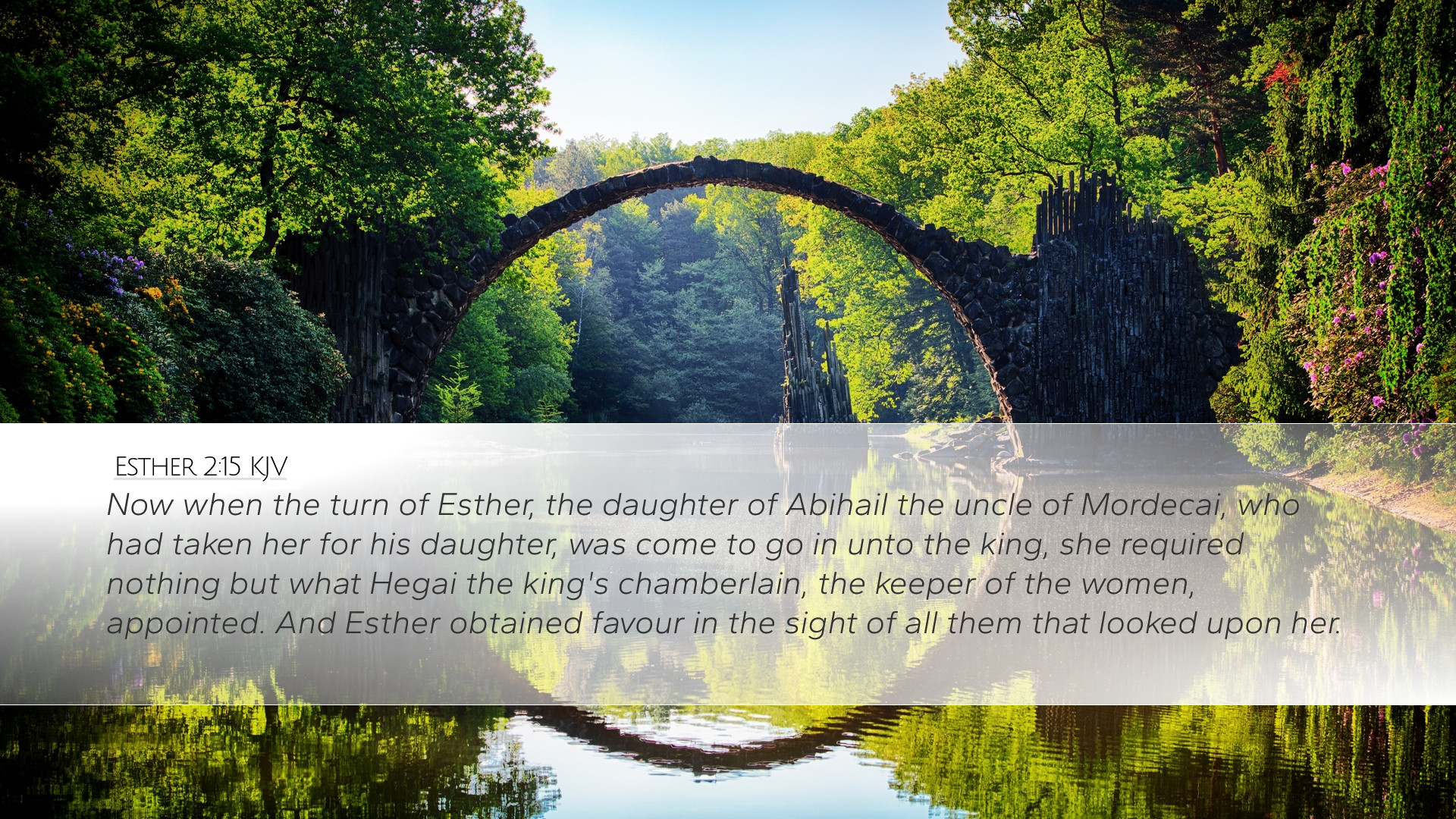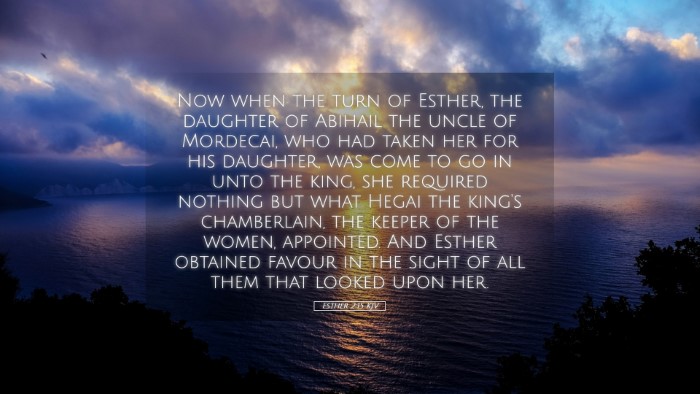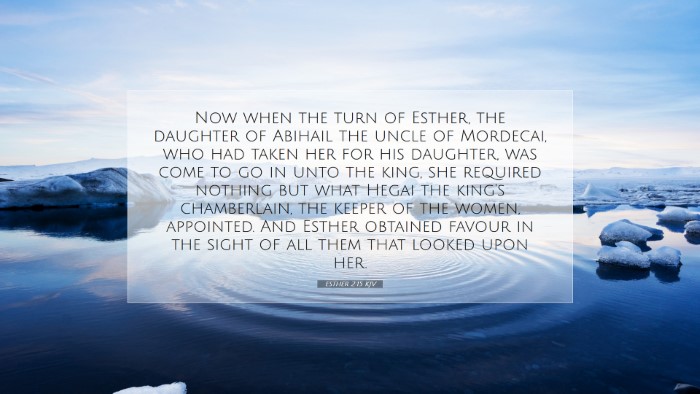Old Testament
Genesis Exodus Leviticus Numbers Deuteronomy Joshua Judges Ruth 1 Samuel 2 Samuel 1 Kings 2 Kings 1 Chronicles 2 Chronicles Ezra Nehemiah Esther Job Psalms Proverbs Ecclesiastes Song of Solomon Isaiah Jeremiah Lamentations Ezekiel Daniel Hosea Joel Amos Obadiah Jonah Micah Nahum Habakkuk Zephaniah Haggai Zechariah MalachiEsther 2:15
Esther 2:15 KJV
Now when the turn of Esther, the daughter of Abihail the uncle of Mordecai, who had taken her for his daughter, was come to go in unto the king, she required nothing but what Hegai the king's chamberlain, the keeper of the women, appointed. And Esther obtained favour in the sight of all them that looked upon her.
Esther 2:15 Bible Commentary
Commentary on Esther 2:15
Esther 2:15 states, "Now when the turn of Esther, the daughter of Abihail the uncle of Mordecai, who had taken her for his daughter, was come to go in unto the king, she required nothing but what Hegai the king's chamberlain, the keeper of the women, appointed. And Esther obtained favor in the sight of all them that looked upon her." This verse marks a significant moment in the development of Esther's character and the unfolding of divine providence in the narrative.
Introduction
This passage introduces Esther's entry into the royal court and highlights her preparation to meet King Ahasuerus. The subtle nuances in this verse are profound, revealing deeper theological implications regarding divine favor and the role of human agency. Matthew Henry, Albert Barnes, and Adam Clarke provide valuable insights into these themes.
Esther's Background
Esther, the Daughter of Abihail
Esther is introduced as the daughter of Abihail, indicating her Jewish heritage and the importance of her lineage. This background highlights God's providential hand in raising Esther for a significant purpose.
- Matthew Henry notes that Esther's Jewish identity plays a critical role, not only in her life but also in the broader context of the Jewish people facing existential threats.
- Albert Barnes emphasizes that this lineage gives Esther her unique place in the providential plan of God, positioning her to act as an instrument for deliverance.
The Preparation Phase
Requirement of Hegai
When Esther is brought before the king for selection as his queen, she seeks counsel from Hegai, the keeper of the women. This demonstrates her humility and wisdom in taking guidance from those knowledgeable in royal affairs.
- Adam Clarke draws attention to the importance of Esther seeking no more than what Hegai provided, reflecting her trust in divine timing and purpose.
- Matthew Henry remarks on Esther's modesty, contrasting it with the ostentation typical of royal courts, suggesting that her character stood out amongst others.
Divine Favor
The Concept of Favor
Esther's success in winning the king's favor is paramount. The phrase "obtained favor" indicates that her acceptance was part of a larger divine orchestration, which aligns with the biblical theme of God favoring those destined for significant roles.
- Albert Barnes states that divine favor is often inexplicable and sovereign, emphasizing that God's choice is not based on human merit but on His eternal purpose.
- Matthew Henry explores the ramifications of Divine Favor, discussing how it is often accompanied by wisdom and grace, allowing individuals to fulfill God's plans effectively.
Broader Context and Implications
Esther as a Type of Savior
Esther's entry into the king's presence can be seen as a typology of Christ's intercessory role. Just as Esther stands before the king on behalf of her people, Christ stands before God interceding for humanity.
- Adam Clarke draws parallels between Esther and Christ, indicating that both embody the theme of sacrificial love and the pursuit of the good of others.
- Matthew Henry highlights that Esther’s willingness to enter the king's court mirrors the confidence believers can have when approaching the throne of grace.
Theological Reflections
The events in Esther 2:15 present several theological reflections pertinent to pastors and scholars:
- The sovereignty of God: The unfolding of Esther’s story illustrates God's sovereignty in historical events, providing assurance that He is active in the world.
- The significance of human agency: Esther's choices exemplify the interplay between divine sovereignty and human actions. This theme encourages an understanding that while God is sovereign, He involves His creation in carrying out His purposes.
- Preparation and submission: Esther's willingness to submit to Hegai’s counsel reflects the importance of wise counsel and preparation in fulfilling God's calling in our lives.
Conclusion
Esther 2:15 encapsulates a pivotal moment within the Book of Esther, laying the groundwork for the ensuing dramatic events. Through the insights of Matthew Henry, Albert Barnes, and Adam Clarke, this passage emerges as a profound exploration of divine favor, human agency, and the overarching sovereignty of God. For pastors, students, theologians, and Bible scholars alike, this verse is a reminder of the significance of our roles in the divine narrative and an encouragement to trust in God's providence as we navigate our own lives and ministries.


